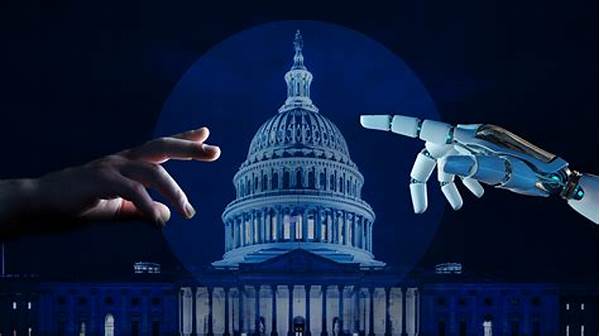How AI Influences Government Policies
In the digital age, artificial intelligence (AI) has emerged as a revolutionary force with the power to transform industries, redefine economic paradigms, and reshape social structures. Not surprisingly, government policies worldwide are not immune to this tidal wave of innovation. The intrigue lies in how AI influences government policies, not only in terms of strategy and execution but also in terms of the capabilities it offers for addressing complex, multifaceted challenges. From enhancing decision-making processes to revolutionizing public services, AI holds a unique position, akin to a plot twist in a thrilling novel, providing both opportunities and dilemmas.
Read More : Top Ai Trends To Watch In 2025
Consider the potential AI brings to policy-making: imagine predictive analytics offering insights into economic forecasts, AI-driven tools enhancing the efficiency of public service delivery, or sophisticated machine learning models identifying patterns in healthcare data to inform policy interventions. These are not just futuristic scenarios; they are gradually becoming the reality. Governments are increasingly turning to AI to craft smarter, data-driven policies. However, while the proposition is enticing, it requires careful handling akin to a delicate balancing act between innovation and regulation.
The journey of how AI influences government policies is an enthralling narrative with elements of drama and suspense, driven by statistical discoveries, anecdotal testimonials, investigative pursuits, and rational analysis. And like any gripping plot, it has its antagonists; concerns about ethics, privacy, and cybersecurity loom large, underscoring the need for a cautious yet forward-thinking approach. Yet, despite these challenges, the allure of AI and its potential to propel government agendas remains irresistible.
Government Adaptation and Potential of AI
The impact of AI on government policies is not just theoretical; it is happening all around us. As AI technologies evolve, they reshape the operational frameworks within which governments function, ensuring more dynamic and responsive systems. From AI-powered chatbots streamlining citizen interaction to machine learning algorithms forecasting environmental changes, the integration of AI into government processes has become indispensable.
Moreover, how AI influences government policies varies based on political, economic, and cultural contexts. In democratic countries, for example, AI could support transparent governance processes by providing clarity and accessibility of information, while in more authoritarian regimes, it could be used to bolster state control. Thus, while AI serves as a catalyst for progress, its transformative potential depends significantly on the governance ethos within which it is deployed.
AI’s Role in Policy Formulation
The ever-evolving dynamics of AI integration into government policy warrant a comprehensive understanding of its possibilities and implications. Not only does AI enhance policy execution, but it also plays an integral role in formulation. Policy-makers equipped with AI tools can access real-time data analytics, enabling them to craft policies that are both timely and contextually relevant. As AI helps decode complex datasets and unveil hidden insights, governments can better anticipate challenges and design responses that are agile and impactful.
By incorporating AI into policy formulation, governments bridge the gap between aspiration and implementation. AI aids in transforming theoretical policy drafts into viable solutions with measurable outcomes, ensuring evidence-based policy-making becomes the cornerstone of modern governance frameworks. The simultaneous advance of AI and its influence on policy-making is not simply a trend, but a transformative step toward a future where government policies become more insightful and efficient.
How AI Enhances Decision-Making in Policies
As AI continues to claim its stake in the governmental landscape, it acts as a powerful tool influencing the entire decision-making process. The infusion of AI into policy decisions enables a level of precision and speed unprecedented in human history. By processing vast troves of data quickly and accurately, AI applications facilitate more informed decisions, thus marginalizing room for errors or outdated information.
Ethical Considerations and Challenges
Despite its advantages, integrating AI into government decision-making is fraught with ethical challenges. The question of transparency and accountability becomes paramount when AI-generated insights influence policies impacting millions of lives. Ensuring that AI systems make decisions that are fair, unbiased, and align with human values is a continuous challenge for policy-makers. Moreover, concerns surrounding data privacy and the potential misuse of AI technology require stringent regulatory measures to safeguard public trust.
To be effective, governments must outline clear ethical guidelines governing AI use, ensuring that the technology enhances, rather than hampers, democratic principles. The way forward involves a collaborative effort encompassing public input, regulatory oversight, and technical innovation, reflecting a balanced approach to AI policy influence crafted in the spirit of equity and social welfare.
Topics Related to “How AI Influences Government Policies”
Setting the Stage for AI-Powered Governance
The curiosity about how AI influences government policies is no longer limited to tech aficionados and policy-makers. It spreads across the societal spectrum, compelling us all to ponder the opportunities and challenges AI brings. As governments embrace this technological marvel, the ultimate goal is to foster a well-informed public ecosystem, encouraging informed dialogues that drive democratic processes forward.
In this vein, governments must strive to educate and engage citizens, making them active participants in the AI integration journey. Realizing the potential of AI in policy-making involves not just leveraging its technological capability, but fostering a participatory environment where public sentiment and AI insights collectively shape governmental agendas. This journey signals a transformative era, and the promise of AI, when rightly harnessed, holds the key to unlocking more resilient, adaptive, and future-proof governance.


